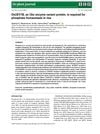 September 2017 in “Majallah-i taḥqīqāt-i ̒ulūm-i pizishkī-i Zāhidān”
September 2017 in “Majallah-i taḥqīqāt-i ̒ulūm-i pizishkī-i Zāhidān” Androgenetic alopecia is a long-term, immune-related disorder that starts during puberty due to androgen secretion, and it might be improved with iron tablets, platelet transfusion, and anti-inflammation therapy.
 19 citations,
January 2015 in “Current problems in dermatology”
19 citations,
January 2015 in “Current problems in dermatology” Ultraviolet rays damage hair, smoking may cause hair loss, and good nutrition is important for hair health, but genetics mainly decide hair thickness.
 October 2024 in “Molecular Nutrition & Food Research”
October 2024 in “Molecular Nutrition & Food Research” Vitamin and mineral imbalances may affect hair loss, but more research is needed.
 January 2020 in “Asian journal of applied science and technology”
January 2020 in “Asian journal of applied science and technology” Good nutrition is crucial for health and preventing disease, and supplements can help prevent nutrient deficiencies.
 October 2012 in “European Neuropsychopharmacology”
October 2012 in “European Neuropsychopharmacology” People with early psychosis eat more calories, saturated fat, and sugar, and the drug olanzapine may lead to eating even more calories.
 May 2024 in “Journal of trace elements in medicine and biology”
May 2024 in “Journal of trace elements in medicine and biology” Overweight or obese women before pregnancy have lower iron levels in their serum and hair during early pregnancy.
 September 2022 in “International Journal of Health Sciences (IJHS)”
September 2022 in “International Journal of Health Sciences (IJHS)” Low zinc levels may contribute to hair loss due to increased oxidative DNA damage.
 5 citations,
February 2020 in “European Food Research and Technology”
5 citations,
February 2020 in “European Food Research and Technology” African baobab fruit is a good source of antioxidants and micronutrients, but too much can cause laxative effects.
 1 citations,
June 2021 in “International Journal of Dermatology”
1 citations,
June 2021 in “International Journal of Dermatology” People with alopecia areata had lower vitamin D levels, but these levels didn't relate to many aspects of the condition.
 May 2024 in “Pakistan Journal of Health Sciences”
May 2024 in “Pakistan Journal of Health Sciences” Iron deficiency is linked to hair loss in CTE patients.
 January 2022 in “United Research Forum eBooks”
January 2022 in “United Research Forum eBooks” Picky eating in children is linked to lower zinc levels and various nutritional deficiencies.

Low vitamin D3 is not linked to different levels of thyroid hormones in people with autoimmune thyroid disease.

Good nutrition may help prevent premature hair graying.
 1 citations,
November 2015 in “Lʹvìvsʹkij klìnìčnij vìsnik”
1 citations,
November 2015 in “Lʹvìvsʹkij klìnìčnij vìsnik” Correcting trace element imbalances may help reduce alopecia areata symptoms.
 82 citations,
August 2017 in “Cell Reports”
82 citations,
August 2017 in “Cell Reports” An imbalanced gut and lack of biotin can cause hair loss in mice.
 2 citations,
November 2023 in “Frontiers in microbiology”
2 citations,
November 2023 in “Frontiers in microbiology” The health of the gut may be important in developing new ways to prevent, diagnose, and treat alopecia areata.
 February 2012 in “InTech eBooks”
February 2012 in “InTech eBooks” PCOS increases the risk of heart disease and type 2 diabetes in women.
 November 2023 in “Aktualʹnì problemi sučasnoï medicini”
November 2023 in “Aktualʹnì problemi sučasnoï medicini” The guidelines suggest using various treatments, including antidepressants and steroids, for alopecia areata and discuss the condition's genetic and immune aspects.

Zinc levels and lymphocyte counts might be important in heart disease development.
 August 2022 in “International Journal of Health Sciences (IJHS)”
August 2022 in “International Journal of Health Sciences (IJHS)” Low levels of zinc, ferritin, and vitamin B12 are linked to severe hair loss in pregnant women during their last two trimesters.
 October 2022 in “Research, Society and Development”
October 2022 in “Research, Society and Development” Vitamins and minerals don't significantly affect hair loss treatment in patients with telogen effluvium.
 October 2022 in “Frontiers in Endocrinology”
October 2022 in “Frontiers in Endocrinology” New tools show that in fish, NPY increases feeding and somatostatin decreases it.
 1 citations,
April 2009 in “The Proceedings of the International Plant Nutrition Colloquium XVI”
1 citations,
April 2009 in “The Proceedings of the International Plant Nutrition Colloquium XVI” Certain genes may promote longer root hairs in plants when phosphorus is low.
 114 citations,
October 2009 in “Gastroenterology”
114 citations,
October 2009 in “Gastroenterology” Zinc is crucial for nutrition, especially in patients with specific health conditions, and requires careful supplementation and monitoring.
 73 citations,
January 2013 in “Annals of Dermatology”
73 citations,
January 2013 in “Annals of Dermatology” People with hair loss, especially those with certain types, have lower zinc levels, and zinc supplements might help.
 4 citations,
February 2021 in “Plant journal”
4 citations,
February 2021 in “Plant journal” OsUEV1B protein is essential for controlling phosphate levels in rice.
 December 2023 in “Frontiers in plant physiology”
December 2023 in “Frontiers in plant physiology” Root hairs are key for developing cereals that can fertilize themselves with nitrogen.
 75 citations,
May 2013 in “Journal of the American Academy of Dermatology”
75 citations,
May 2013 in “Journal of the American Academy of Dermatology” Zinc deficiency in children can cause skin issues and can be serious if not diagnosed and treated properly.
 23 citations,
January 2013 in “Indian Journal of Dermatology, Venereology and Leprology”
23 citations,
January 2013 in “Indian Journal of Dermatology, Venereology and Leprology” FPHL causes hair loss in women due to genetics and hormones; minoxidil and anti-androgens are treatments, and early intervention is advised.
 15 citations,
January 2016 in “Sustainable development and biodiversity”
15 citations,
January 2016 in “Sustainable development and biodiversity” Using PGPR as biofertilizers can improve soil health and plant growth while reducing reliance on synthetic fertilizers.





























